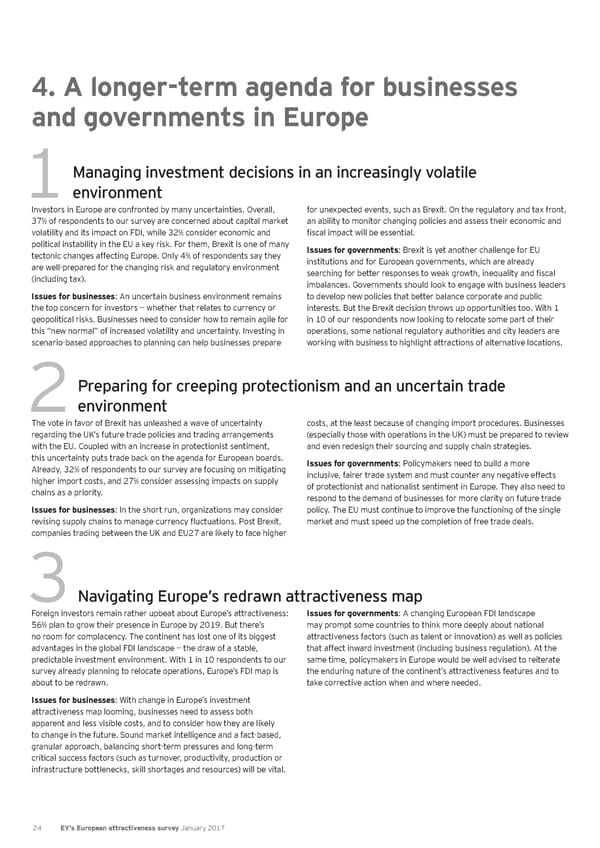4. A longer-term agenda for businesses and governments in Europe 1Managing investment decisions in an increasingly volatile environment Investors in Europe are confronted by many uncertainties. Overall, for unexpected events, such as Brexit. On the regulatory and tax front, 37% of respondents to our survey are concerned about capital market an ability to monitor changing policies and assess their economic and volatility and its impact on FDI, while 32% consider economic and fiscal impact will be essential. political instability in the EU a key risk. For them, Brexit is one of many Issues for governments: Brexit is yet another challenge for EU tectonic changes affecting Europe. Only 4% of respondents say they institutions and for European governments, which are already are well-prepared for the changing risk and regulatory environment searching for better responses to weak growth, inequality and fiscal (including tax). imbalances. Governments should look to engage with business leaders Issues for businesses: An uncertain business environment remains to develop new policies that better balance corporate and public the top concern for investors — whether that relates to currency or interests. But the Brexit decision throws up opportunities too. With 1 geopolitical risks. Businesses need to consider how to remain agile for in 10 of our respondents now looking to relocate some part of their this “new normal” of increased volatility and uncertainty. Investing in operations, some national regulatory authorities and city leaders are scenario-based approaches to planning can help businesses prepare working with business to highlight attractions of alternative locations. Preparing for creeping protectionism and an uncertain trade 2environment The vote in favor of Brexit has unleashed a wave of uncertainty costs, at the least because of changing import procedures. Businesses regarding the UK’s future trade policies and trading arrangements (especially those with operations in the UK) must be prepared to review with the EU. Coupled with an increase in protectionist sentiment, and even redesign their sourcing and supply chain strategies. this uncertainty puts trade back on the agenda for European boards. Issues for governments: Policymakers need to build a more Already, 32% of respondents to our survey are focusing on mitigating inclusive, fairer trade system and must counter any negative effects higher import costs, and 27% consider assessing impacts on supply of protectionist and nationalist sentiment in Europe. They also need to chains as a priority. respond to the demand of businesses for more clarity on future trade Issues for businesses: In the short run, organizations may consider policy. The EU must continue to improve the functioning of the single revising supply chains to manage currency fluctuations. Post Brexit, market and must speed up the completion of free trade deals. companies trading between the UK and EU27 are likely to face higher 3Navigating Europe’s redrawn attractiveness map Foreign investors remain rather upbeat about Europe’s attractiveness: Issues for governments: A changing European FDI landscape 56% plan to grow their presence in Europe by 2019. But there’s may prompt some countries to think more deeply about national no room for complacency. The continent has lost one of its biggest attractiveness factors (such as talent or innovation) as well as policies advantages in the global FDI landscape — the draw of a stable, that affect inward investment (including business regulation). At the predictable investment environment. With 1 in 10 respondents to our same time, policymakers in Europe would be well advised to reiterate survey already planning to relocate operations, Europe’s FDI map is the enduring nature of the continent’s attractiveness features and to about to be redrawn. take corrective action when and where needed. Issues for businesses: With change in Europe’s investment attractiveness map looming, businesses need to assess both apparent and less visible costs, and to consider how they are likely to change in the future. Sound market intelligence and a fact-based, granular approach, balancing short-term pressures and long-term critical success factors (such as turnover, productivity, production or infrastructure bottlenecks, skill shortages and resources) will be vital. 24 EY’s European attractiveness survey January 2017
 European attractiveness survey January 2017 Page 30 Page 32
European attractiveness survey January 2017 Page 30 Page 32